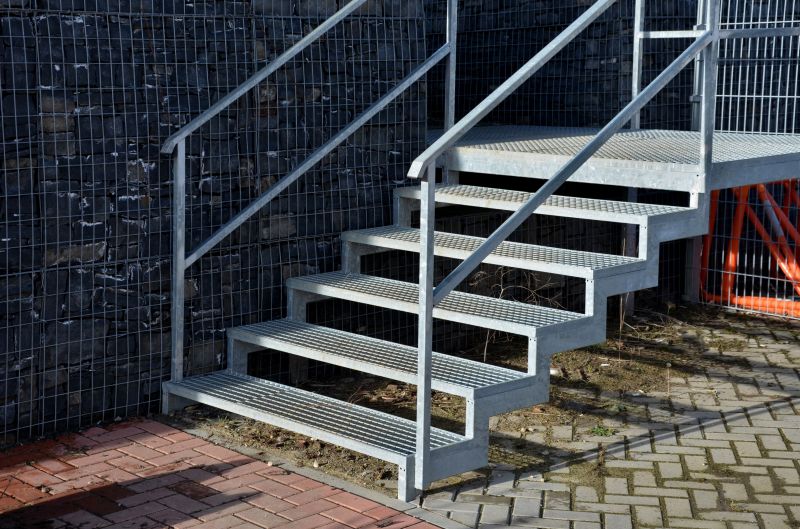Top-Rated Staircase Bracing Products For Structural Integrity
Choose from the most highly rated staircase bracing solutions designed to provide maximum support and safety.
 Staircase bracings are essential components in both residential and commercial settings to ensure the stability and safety of stair structures. They serve as supportive elements that reinforce the staircase framework, preventing unwanted movement and maintaining alignment over time. Selecting the right bracing products can help preserve the integrity of the staircase, especially in areas prone to structural shifts or heavy usage. Materials used in bracing options vary widely, including wood, metal, and composite materials, each offering different advantages in terms of strength, durability, and ease of installation.
Staircase bracings are essential components in both residential and commercial settings to ensure the stability and safety of stair structures. They serve as supportive elements that reinforce the staircase framework, preventing unwanted movement and maintaining alignment over time. Selecting the right bracing products can help preserve the integrity of the staircase, especially in areas prone to structural shifts or heavy usage. Materials used in bracing options vary widely, including wood, metal, and composite materials, each offering different advantages in terms of strength, durability, and ease of installation.
Top Overall Option
Adjustable Metal Staircase Support System
This versatile support system offers adjustable tension and customizable configurations to fit a wide range of staircase designs. Made from durable metal, it provides reliable stability and can be easily installed or removed as needed. Its adaptability makes it suitable for both residential and commercial applications, ensuring structural integrity over time.
Types of Products For Staircase Bracing
Metal Cross Braces
Steel or aluminum cross braces provide lateral support and are often used in load-bearing staircases to prevent sway.
Tension Cables
Flexible cables that can be tensioned to stabilize stair stringers and balustrades, offering a sleek, modern look.
Wooden Support Beams
Traditional wooden supports that blend seamlessly with wooden staircases, providing reliable reinforcement.
Adjustable Support Posts
Height-adjustable posts designed to accommodate uneven surfaces and provide customizable support.
Wall-Mounted Brackets
Brackets fixed to walls to support stringers or handrails, improving lateral stability.
Cable Rail Supports
Supports designed specifically for cable railing systems, combining safety with aesthetic appeal.
Steel Frame Kits
Complete framing kits that include multiple components for constructing or reinforcing staircase frameworks.
Corrosion-Resistant Supports
Supports made from materials resistant to rust and corrosion, suitable for outdoor or humid environments.
Decorative Metal Supports
Design-focused supports that add an aesthetic element while providing structural reinforcement.
Composite Support Materials
Innovative composite supports that combine strength with lightweight properties, suitable for modern staircase designs.
Popular Choices
Widely used for modern staircases, these tensioners allow for easy adjustment of cable supports.
Commonly installed to support stringers against walls, providing stability and safety.
Flexible posts that can be customized in height to ensure proper support on uneven surfaces.
Complete kits that facilitate quick assembly and reinforcement of staircase frameworks.
Supports with aesthetic appeal, blending function with design in contemporary staircases.
Supports designed for durability in outdoor or high-humidity environments.
Traditional supports that complement wooden staircase designs, providing reliable reinforcement.
Complete systems for cable railing installations, popular in modern interior designs.
Cables that can be tensioned to ensure stability and safety of the staircase structure.
Brackets that reinforce stringers against lateral movement, often used in retrofit projects.
Properly installed staircase bracings contribute significantly to the overall safety of a building. They can be used in various configurations such as cross braces, tension cables, or adjustable supports, depending on the specific requirements of the staircase design. When choosing bracing products, it is important to consider factors such as load capacity, compatibility with existing structures, and ease of adjustment or removal for maintenance. Many modern staircase designs incorporate innovative bracing solutions that blend functionality with aesthetic appeal, enhancing the visual appeal while ensuring safety.
In addition to structural support, staircase bracings can also serve as a design element, adding to the architectural style of a space. For instance, decorative metal braces or custom wood supports can complement the overall interior or exterior design theme. It is advisable to consult with a structural engineer or a professional builder to determine the most suitable bracing options for your specific staircase, especially in cases involving complex or custom designs. Proper selection and installation of staircase bracing products can help extend the lifespan of your staircase and provide peace of mind for users.
Whether you are undertaking a renovation, building a new staircase, or reinforcing an existing one, understanding the variety of available products and their specific applications can be highly beneficial. From simple tension cables to elaborate metal frameworks, there are numerous options to suit different needs and preferences. Investing in quality staircase bracing products and ensuring correct installation can contribute significantly to the safety, stability, and aesthetic value of your staircase setup.
Key Buying Considerations
- Material durability and resistance to environmental factors
- Compatibility with existing staircase design and materials
- Load capacity and safety standards compliance
- Ease of installation and adjustability features
- Aesthetic integration with overall staircase and interior design
- Corrosion resistance for outdoor applications
- Flexibility in configuration for custom staircase layouts
- Weight of the support system and ease of handling during installation
- Availability of replacement parts or modular components
- Cost-effectiveness relative to project scope and budget
- Compatibility with other structural components like handrails and balustrades
- Manufacturer reputation and product reviews
- Warranty and support services offered
- Ease of maintenance and cleaning
- Compliance with local building codes and regulations
This page contains affiliate links. We may earn a commission if you make a purchase through these links, at no additional cost to you.
